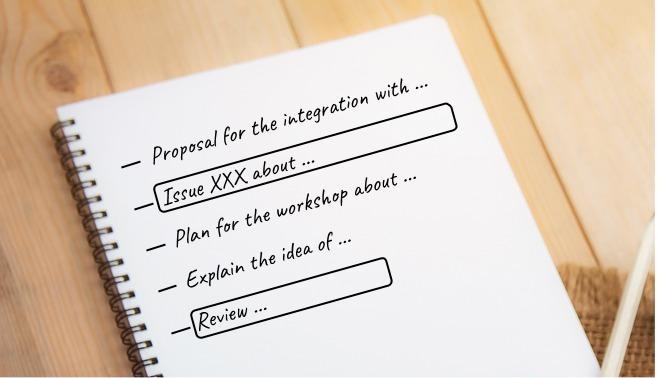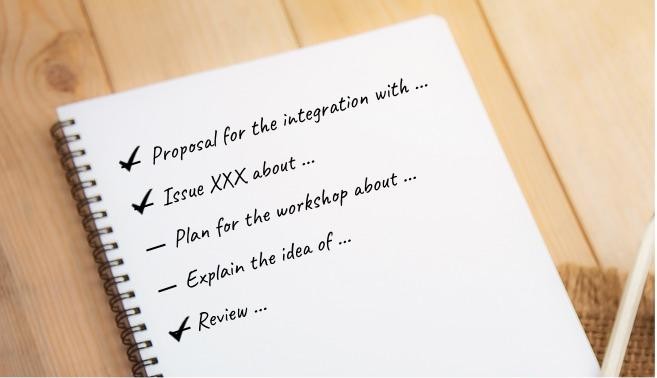My main Getting Things Done (GTD) tool

Last updated: 30 October 2021
Motivation
Rachel, how do you organize yourself? With a Trello board?
Hi! With a notebook and a pen.
Introduction
After 2 internships and 2 fellowships, I got my first real job.
I received a branded notebook and a pen. No laptop, those were other times.
However, that notebook marked my time management from the beginning.
I started writing all the things I had to do. The list was growing.
Ok, this is done. A strikethrough line? Oh, no, that’s messy. What about a symbol?
My notebook
I usually choose DinA4 size, because I’ll also use the notebook to think and to draw diagrams, mind maps or schemes.
And I prefer not to mix colors on a single page of the notebook, so I only use a black or blue pen.
List of tasks
I write down every pending task with an initial dash:

Anything that I must do is an item on the list.
I collect everything.
This is one of the fundamental ideas about Getting Things Done (GTD).
Priority tasks
If there are priority tasks on the list, I surround them to see them quickly:

And if there is a relationship between some priority tasks, I draw a line connecting them:

Marking as done
When I finish a task, I draw a check on the corresponding dash:

In this way, I can identify pending and finished tasks easily.
I prefer not to draw strikethrough lines in order to be able to read the finished tasks easily.
Handling interruptions
It’s easy to silence notifications on tools. However, what about personal interruptions?
I don’t have a single way to handle those interruptions although I always need to write down something:
- When it’s not an urgent need, I can inform them that I’m in the middle of a task and I’ll contact them as soon as possible. It’s important to write down that request not to forget it and to keep focused.
- When it’s an urgent request, I need to write down what I’m doing before the interruption. Just a few seconds will save me a lot of time afterwards.
Reflecting
At the end of the day, I review the notebook to plan the next day:
- This one is too big for a day. I’m going to split it. Tomorrow … Otherwise, it will be a task ripe for procrastination.
- I didn’t do this one and it’s important. I’ll start with it tomorrow morning. And that’s translated into a surrounding area with a “1st” on it.
- Pending tasks in several pages. I’m going to write them down again so as not to have to review so many pages. When rewriting them, I reflect about them and they can be transformed into new tasks.
- There were a lot of interruptions about … I’m going to plan a task to review …
- etc.
Other tools
In addition to the notebook, I need two calendars to organize myself:
- A digital calendar for working hours. I use different colors according to the type of event to get a quick planning overview.
- A wall calendar at home to organize my leisure time and to mark important events. The cheaper and best option is a simple calendar with enough room to write down things on each day.
When I need timeboxing or regular breaks, I use a Pomodoro timer to follow the Pomodoro technique and I adapt the Pomodoro time according to the type of activities or my energy level in that moment (from 25 minutes to 40 minutes).
Friendly reminder
Break down all the large tasks (not only development tasks).
Further reading
- Not Busy, Focused by Joshua Fields Millburn
- What is GTD? by David Allen
- The 6 horizons of focus by David Allen
- Stop doing productive and start being productive by Mike Vardy
- The one piece of time management advice that you should definitely follow by Mike Vardy
- Pomodoro technique by Francesco Cirillo
- Pomodoro technique illustrated by Staffan Nöteberg
- Poster: Monotasking in a Nutshell by Staffan Nöteberg
Update
I loved this video about The sustainable future of developer productivity by Eirini Kalliamvakou.
Why?
- Productivity reports are not only interesting for managers but also developers.
- Focus not only on activity.
- The benefit of 2-minute reflection at the end of the day (related to what I explained at Reflecting).
- Fewer meetings!
- Mentorship is mentioned.
Look at more details at Octoverse Spotlight 2021: The Good Day Project - Personal analytics to make your work days better.
